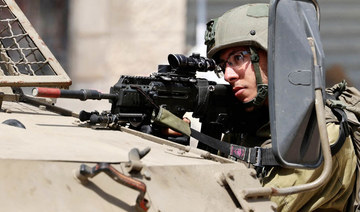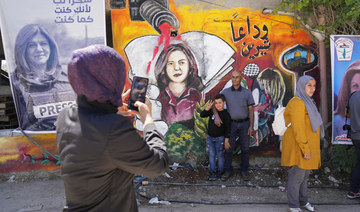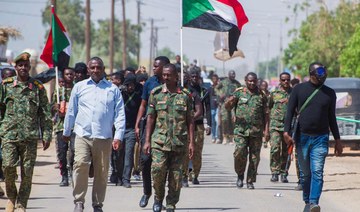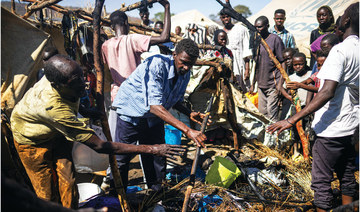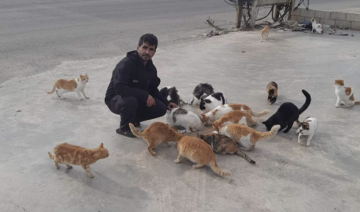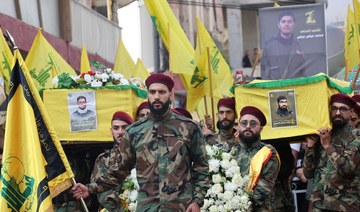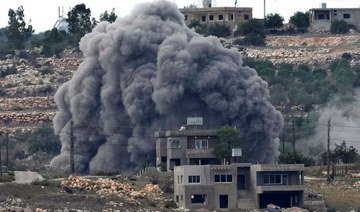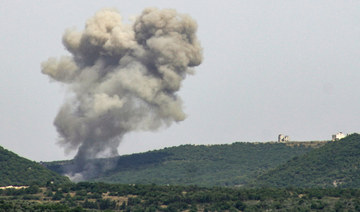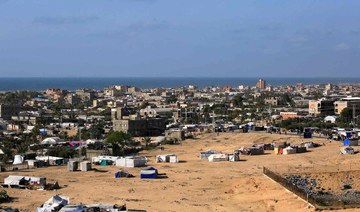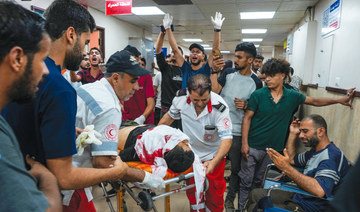JERUSALEM: A far-right Israeli lawmaker, joined by scores of ultranationalist supporters, entered Jerusalem’s most sensitive holy site early Sunday, prompting a crowd of Palestinians to begin throwing rocks and fireworks toward nearby Israeli police.
The unrest erupted ahead of a mass ultranationalist Israeli march planned later Sunday through the heart of the Muslim Quarter of Jerusalem’s Old City. Some 3,000 Israeli police were deployed throughout the city ahead of the march.
Israel says the march is meant to celebrate Israel’s capture of east Jerusalem, including the Old City, in the 1967 Mideast war. Israel claims all of Jerusalem as its capital. But Palestinians, who claim east Jerusalem as their capital, see the march as a provocation. Last year, the parade helped trigger an 11-day war between Israel and Gaza militants.
Sunday’s unrest took place in a contested hilltop compound revered by Jews and Muslims. The compound is home to the Al Aqsa Mosque, the third-holiest site in Islam. It also the holiest site for Jews, who call it the Temple Mount and revere it as the home of the biblical Temples. The competing claims to the site lie at the heart of the Israeli-Palestinian conflict and have triggered numerous rounds of violence.
Itamar Ben-Gvir, leader of a small ultranationalist opposition party in party and a follower of the late racist rabbi, Meir Kahane, entered the compound early Sunday along with dozens of supporters.
Palestinians shouted “God is great” as Ben-Gvir, accompanied by Israeli police, shouted “the Jewish people live.” Later, a crowd of Palestinians barricaded inside the mosque threw fireworks and stones toward police, who did not immediately respond.
Sunday’s march comes at a time of heightened tensions. Israeli police have repeatedly confronted stone-throwing Palestinian demonstrators in the disputed compound in recent months, often firing rubber bullets and stun grenades.
At the same time, some 19 Israelis have been killed by Palestinian attackers in Israel and the West Bank in recent weeks, while over 35 Palestinians have been killed in Israeli military operations in the occupied West Bank. Many of those killed were Palestinian militants, but several civilians were also among the dead, including Shireen Abu Akleh, a well-known correspondent for the Al Jazeera satellite channel.
Jerusalem police were widely criticized for beating mourners at Abu Akleh’s funeral two weeks ago.
Under longstanding arrangements known as the “status quo,” Jewish pilgrims are allowed to enter the hilltop compound but they are not allowed to pray. In recent years, however, the number of Jewish visitors has grown significantly, including some who have been spotted quietly praying.
Such scenes have sparked Palestinian fears that Israel is plotting to take over or divide the area. Israel denies such claims, saying it remains committed to the status quo.
Visit by far-right Israeli lawmaker sparks Jerusalem unrest
https://arab.news/cw2jv
Visit by far-right Israeli lawmaker sparks Jerusalem unrest

- The unrest erupted ahead of a mass ultranationalist Israeli march planned later Sunday
- Sunday’s unrest took place in a contested hilltop compound revered by Jews and Muslims
Over 100 people ‘killed in 2 weeks of fighting in Sudanese city’
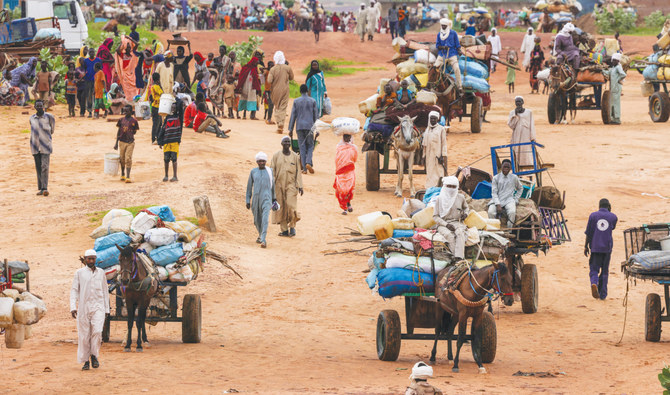
CAIRO: More than two weeks of fighting between Sudan’s military and a notorious paramilitary group over a major city in the western Darfur region killed at least 123 people, an international aid group said on Sunday.
The fighting in El-Fasher, the provincial capital of North Darfur province, also wounded more than 930 people in the same period, Doctors without Borders said.
“This is a sign of the violent intensity of the fighting,” the group said.
“We urge the warring parties to do more to protect civilians.”
Clashes between the military and the paramilitary Rapid Support Forces escalated earlier this month in the city, forcing thousands of people to flee their homes, according to the UN.
El-Fasher has become the center of the conflict between the military and the RSF, aided by militias commonly known as Janjaweed.
The city is the last stronghold held by the military in the sprawling Darfur region.
Sudan’s conflict began in April last year when soaring tensions between the leaders of the military and the RSF exploded into open fighting in the capital, Khartoum, and elsewhere in the country.
The conflict killed more than 14,000 people and wounded thousands more amid reports of widespread sexual violence and other atrocities that rights groups say amount to war crimes and crimes against humanity.
It also pushed the country’s population to the brink of famine.
The UN food agency warned the warring parties earlier this month that there is a serious risk of widespread starvation and death in Darfur and elsewhere in Sudan if they don’t allow humanitarian aid into the vast western region.
In recent months, the RSF has built up forces seeking to wrest control of El-Fasher.
Along with its militia allies, the RSF besieged the city and launched a major attack on its southern and eastern parts earlier this month.
The UN’s International Organization for Migration reported that clashes renewed on Thursday in the Abu Shouk camp for displaced people in the Salam neighborhood in the city’s northern and southern western parts.
On Saturday, a shell hit the house of a Doctors Without Borders aid worker close to the city’s main market, killing the worker, the charity said.
‘Ground trembles’ as Hezbollah launches 150 missiles in revenge strike
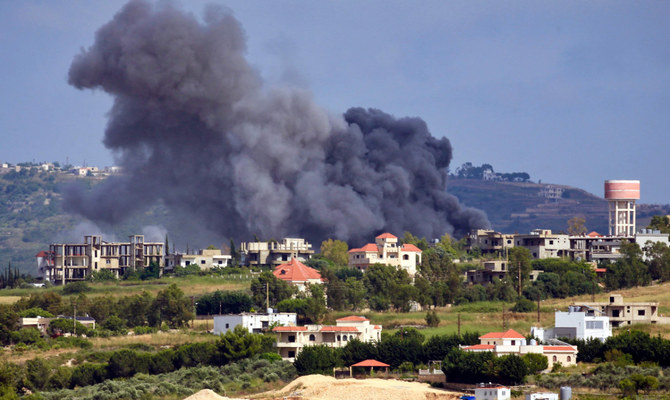
- The attacks marked a significant deterioration in the situation on the southern Lebanese border
BEIRUT: Residents of southern Lebanon’s border area took shelter late on Sunday as Hezbollah launched more than 150 missiles at targets inside Israel in one of the largest attacks since the conflict began.
“The ground trembles beneath us and the sky is covered by missiles,” one resident told Arab News.
Hezbollah’s barrage followed a series of Israeli drone strikes earlier in the day that killed at least eight of the group’s members and civilians.
Hezbollah responded by launching missiles toward Kiryat Shmona, the Golan, and military sites in the Al-Manara and Misgav Am areas.
The attacks marked a significant deterioration in the situation on the southern Lebanese border.
“These are unprecedented barrages of missiles,” the resident said.
“The area is shaking from the sounds of missiles above our heads heading toward the other side of the border. We see Iron Dome explosions above the towns all the way to the Nabatiyeh area.”
After the two deadly attacks on Naqoura and Aita Al-Shaab earlier on Sunday, the Israeli army struck a motorcycle in the town of Hula with a missile from a military drone, killing three Hezbollah members, Tariq Awad, Hussein Salman Mustafa, and Wissam Ali Hamid, whose brother was killed in an Israeli attack on the city of Bint Jbeil a few weeks ago.
The Israeli army attacked the town of Yaron in the Bint Jbeil district with two air-to-surface missiles, killing two Hezbollah members.
The towns of Aitaroun and Al-Adisa were hit by dozens of phosphorus shells, causing’ fires in several neighborhoods.
Sirens sound in Tel Aviv for the first time in months as Hamas says it fired rockets from Gaza
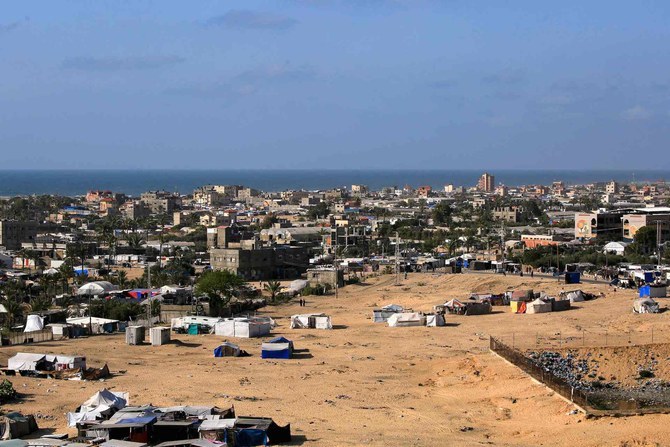
- Hamas armed wing says fired ‘large rocket barrage’ at Tel Aviv
- Aid trucks begin entering Gaza through Kerem Shalom crossing
CAIRO/TEL AVIV: Rocket sirens blared Sunday in Israel’s commercial hub of Tel Aviv for the first time in months, with at least three blasts reported across central Israel, AFP correspondents said.
The Israeli military said sirens had been activated over central Israel as fighting raged in Gaza, including in the far-southern city of Rafah.
The armed wing of Palestinian militant group Hamas said it had launched a “large rocket barrage” on Tel Aviv.
The Ezzedine al-Qassam Brigades said in a post on Telegram that they had targeted Tel Aviv “with a large rocket barrage in response to the Zionist massacres against civilians.”
There were no immediate reports of casualties or damage from the latest barrage.
Earlier on Sunday, aid trucks entered Gaza from southern Israel through a new agreement to bypass the Rafah crossing with Egypt after Israeli forces seized the Palestinian side of it earlier this month. But was unclear if humanitarian groups would be able to access the aid because of ongoing fighting in the area.
A total of “200 trucks” had moved from the Egyptian side of the Rafah border crossing, which has been shut since early May when Israel seized the Palestinian side of the terminal, to the Kerem Shalom crossing, some 4 kilometers (2.5 miles) to the south.
Egypt has refused to coordinate aid through Rafah as long as Israeli troops control the Palestinian side.
But on Friday, Egyptian President Abdel Fattah El-Sisi agreed in a call with his US counterpart Joe Biden to allow aid through Kerem Shalom, the other entry point into southern Gaza, the White House said.
Al-Qahera News did not specify how many trucks had made their way through inspection into besieged Gaza, but said “four fuel trucks” had already crossed and were heading to hospitals.
All aid from Egypt is inspected by Israeli authorities and distributed via the United Nations.
The remainder of the 200 trucks were “expected to cross into Gaza today,” Khaled Zayed, head of the Egyptian Red Crescent in Al-Arish — where the bulk of aid arrives — said.
Drones kill 3 as Israel widens southern Lebanon attacks
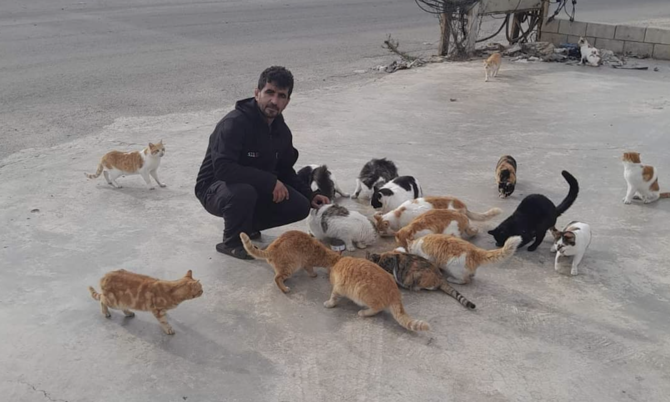
- Strike near UN peacekeeping base in Naqoura kills Hezbollah member
- ‘We are waiting for you,’ Lebanese MP says after Israeli threat of ‘open war’
BEIRUT: Three people, including two civilians, were killed in drone strikes on Sunday as the Israeli army stepped up its attacks on Hezbollah and its ally in southern Lebanon.
The first strike, near a UNIFIL site in Naqoura, killed a Hezbollah member later identified as Mohammed Baydoun.
A second Israeli drone targeted a motorcycle in Aita Al-Shaab, killing a civilian named as Rafik Hassan Kassem, and badly injuring another man, Hussein Saleh, who later died from his wounds.
Saleh, a mechanic with no political affiliations, used to travel to nearby towns to feed domestic animals left behind by owners who fled the region. Arab News had previously interviewed him.
People close to Saleh said that “everyone advised him to stop visiting border villages in fear of being targeted, but he insisted on fulfilling his humanitarian duty.”
An Israeli drone also struck Jabal Al-Blat, opposite Israel’s Zar’it settlement, targeting a transmission tower for Hezbollah’s Al-Manar TV Channel.
As hostilities between Hezbollah and Israel entered their 231st day, Khiam village was subjected to heavy Israeli raids, with military drones striking four targets.
In less than 48 hours, Israeli shelling reached the outskirts of Chihine, Majdal Zoun, Kfarhamam in Wadi Hamoul, Zebqine, and Naqoura.
Shelling subsequently reached the villages of Rachaya Al-Foukhar, Hamoul, Zebqine, Labbouneh, the Makraba forest, and the eastern outskirts of Khiam.
A fire erupted after a number of shells landed on the outskirts of Rab Al-Thalathine, near Al-Taybeh village.
Israeli raids on Aita Al-Shaab in the central sector caused serious damage to property, infrastructure and homes.
Hezbollah also announced the deaths of two people in Israeli raids on Aitaroun late on Saturday night.
One of the victims was named as Bilal Amin Mourad, a former principal in the Aitaroun public vocational school. Caretaker Minister of Education Abbas Halabi mourned Mourad’s death on Sunday.
Israeli army spokesperson Avichay Adraee said that the military struck Hezbollah targets in five regions in southern Lebanon.
He said that warplanes raided Hezbollah’s infrastructure and military buildings in Khiam and Aita Al-Shaab, adding that several areas in Khiam, Houla, Markaba and Kfarkila were also bombed.
Sirens sounded in Israeli settlements adjacent to the Lebanese border, including Shlomi, Betzet, Hanita, Ras Naqoura in western Galilee, Avivim in the upper Galilee, and Kiryat Shmona and its surroundings.
Meanwhile, missiles landed in an Israeli army site near Shlomi.
Israeli Army Radio announced that “two anti-armor missiles were launched from Lebanon toward Margaliot in the Galilee panhandle.”
The Israeli Channel 12 said “about 10 missiles were launched from Lebanon toward the Zar’it settlement in the upper Galilee, with no casualties reported.”
Hezbollah’s operations targeted “technical systems in the Israeli Al-Abad site with appropriate weapons, striking it directly and completely destroying it.”
The militant group also struck “a Merkava tank with a direct missile in the Al-Marj site, destroying it and killing and injuring its members.”
It subsequently targeted the Zibdine site in the Shebaa farms and a building for the Israeli soldiers in the Al-Manara settlement. It also hit two buildings for the Israeli soldiers in the Metula settlement and two other buildings for the Israeli soldiers in the Shtula settlement.
MP Mohammed Raad, head of Hezbollah’s parliamentary bloc, responded on Sunday to Israeli statements threatening to wage open war on Lebanon, saying: “We know your situation accurately, and we know who you are and we are waiting for you.”
In response to those criticizing the attacks in southern Lebanon in support of the Gaza Strip, Raad said: “When criminals take their crimes too far, they don’t spare anyone. That’s why we should prevent the enemy from looking for another target, so we don’t wind up being the other victims.”
Referring to the kamikaze drones used to strike Israeli targets, Sheikh Nabil Kaouk, a member of Hezbollah’s Central Council, promised further operations that will “surprise and humiliate the enemy.”
He said: “For the first time in the history of the Arab-Israeli conflict, Lebanese planes raid Israeli sites in occupied Palestine.”
Recognizing Palestinian state is ‘justice’ for Palestinians: Spain

- Welcoming Spain’s move to recognize the Palestinian state on Tuesday, Mustafa said: “We want to have every country in Europe to do the same”
BRUSSELS: Recognizing the State of Palestine “is justice for the Palestinian people (and) the best guarantee of security for Israel,” Spain’s foreign minister Jose Manuel Albares said Sunday alongside Palestinian prime minister Mohammed Mustafa.
Welcoming Spain’s move, with Norway and Ireland, to recognize the Palestinian state on Tuesday, Mustafa said, “We want to have every country in Europe to do the same.”
Albares and Mustafa spoke side-by-side in Brussels, where the Palestinian leader was also meeting EU foreign policy chief Josep Borrell and Norwegian Foreign Minister Espen Barth Eide.
Later Sunday, Mustafa was to have further talks with Borrell, Barth Eide and Saudi Foreign Minister Prince Faisal bin Farhan.
On Monday he will have another meeting in Brussels with the Spanish, Norwegian and Irish ministers. And on Wednesday he will be in Spain.
Israel has warned Spain, Norway and Ireland that ties with them will face “serious consequences” for their announced recognition of a Palestinian state.
Israel’s devastating war in Gaza in retaliation for Hamas’s October 7 attack has given impetus to countries wanting recognition of the State of Palestine.
They hope that the steps toward a long-elusive two-state solution, with Israel and a Palestinian state, will build foundations for Middle East peace.
A majority of UN member countries recognize Palestinian statehood. European countries are split on the issue.
Spain, Norway and Italy will join EU nations Bulgaria, Cyprus, the Czech Republic, Hungary, Poland, Romania and Sweden in recognizing the State of Palestine.
Mustafa said recognition of a Palestinian state addresses “the injustice that has been inflicted on the Palestinian people for decades.”
“We hope that this momentum of recognitions and initiatives will continue,” he said.



